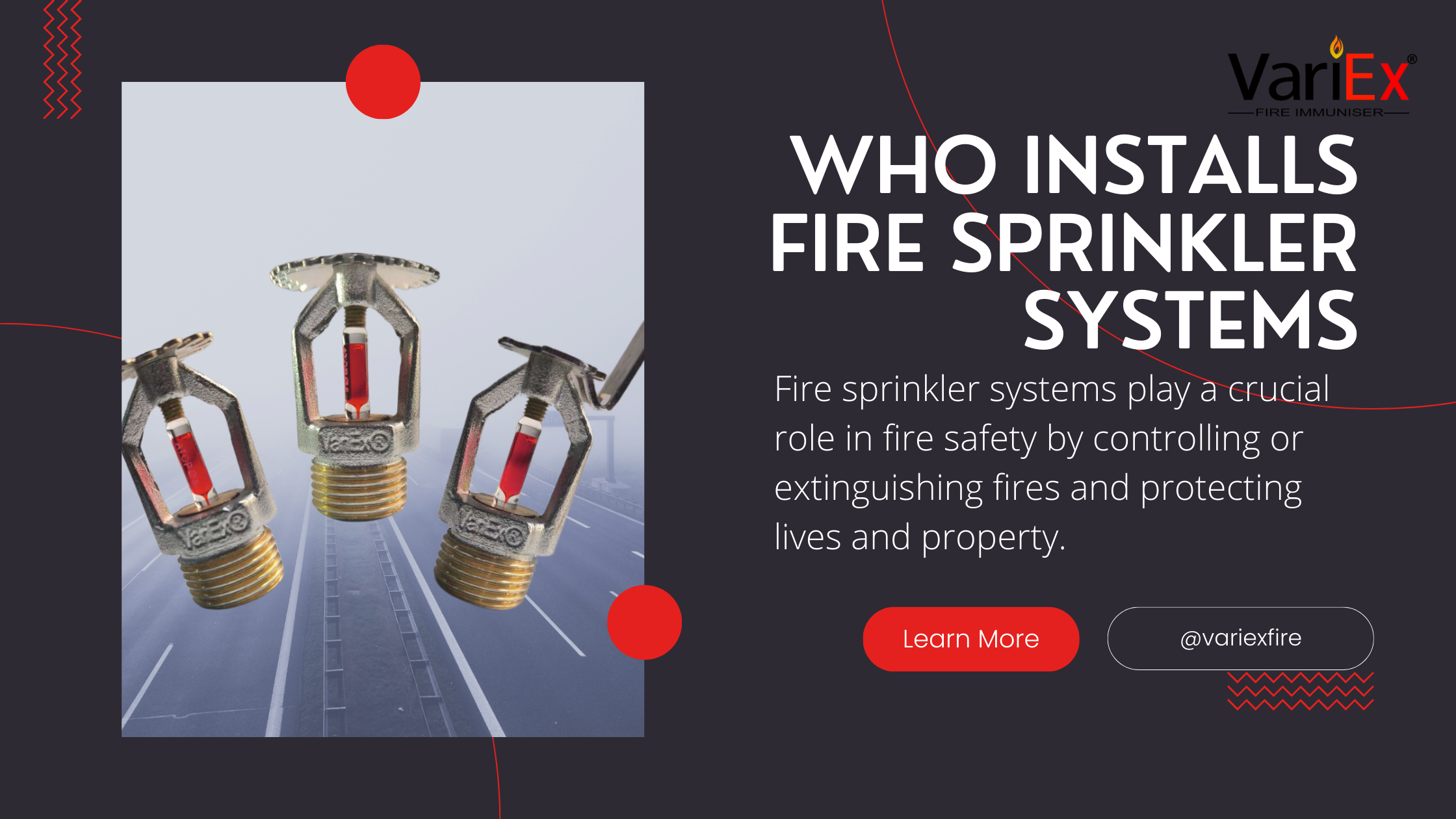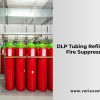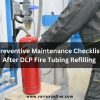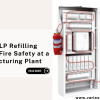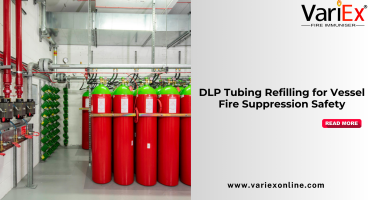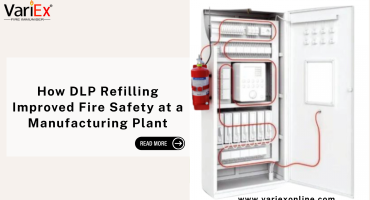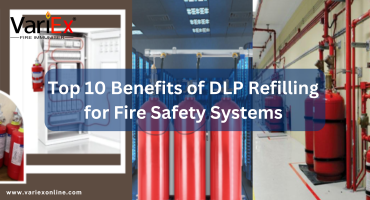![]()
Fire Immuniser
+91-7829629111
Email: info@variex.in
Varistor Technologies Pvt. Ltd.
Block-1, First Floor, Ardente Office One, Hoodi Circle, ITPL Main Road, Bengaluru, Karnataka 560048, IN
Who Installs Fire Sprinkler Systems
Who Installs Fire Sprinkler Systems
Fire sprinkler systems play a crucial role in fire safety by controlling or extinguishing fires and protecting lives and property. However, the installation of these systems is a complex process that requires specialized knowledge and skills. This article explores the various professionals involved in installing fire sprinkler systems, the installation process, and the qualifications necessary for effective and compliant installations.
Understanding Fire Sprinkler Systems
Before delving into who installs fire sprinkler systems, it’s essential to understand what these systems entail. Fire sprinkler systems are automated systems designed to detect and suppress fires using water. They consist of a network of pipes, sprinkler heads, a water supply, and sometimes additional components such as alarms and control panels.
Types of Fire Sprinkler Systems
- Wet Pipe Systems: The most common type, these systems are filled with water at all times. When a sprinkler head activates, water is immediately released.
- Dry Pipe Systems: These systems contain pressurized air in the pipes, preventing water from entering until a sprinkler head is activated.
- Pre-Action Systems: Combining elements of both wet and dry systems, these systems require activation of a fire detection system before water is released.
- Deluge Systems: Used in high-hazard areas, these systems release water from all sprinkler heads simultaneously when activated.
- Water Mist Systems: Utilizing fine water droplets, these systems suppress fires by cooling and displacing oxygen.
Who Installs Fire Sprinkler Systems?
1. Fire Protection Engineers
Fire protection engineers are professionals specializing in designing fire safety systems, including fire sprinklers. They assess a building's layout, occupancy, and fire hazards to create effective sprinkler system designs.
Roles and Responsibilities:
- System Design: Engineers determine the appropriate type and layout of the sprinkler system based on building codes, occupancy type, and fire hazards.
- Hydraulic Calculations: They perform calculations to ensure sufficient water pressure and flow rates for effective sprinkler performance.
- Code Compliance: Fire protection engineers ensure that the system design complies with local, state, and national fire safety codes.
2. Fire Sprinkler Contractors
Fire sprinkler contractors are specialized companies that install, maintain, and inspect fire sprinkler systems. They have the necessary equipment, manpower, and expertise to carry out installations according to industry standards.
Roles and Responsibilities:
- Installation: Contractors manage the physical installation of the sprinkler system, including laying pipes, installing sprinkler heads, and connecting to water supplies.
- Coordination with Other Trades: They work alongside other construction professionals, such as electricians and plumbers, to integrate the fire sprinkler system into the overall building infrastructure.
- System Testing: After installation, contractors test the system to ensure it functions correctly, adhering to manufacturer specifications and code requirements.
3. Licensed Fire Sprinkler Fitters
Fire sprinkler fitters are skilled tradespeople who specialize in installing and maintaining fire sprinkler systems. They are typically required to hold specific licenses and certifications to ensure they meet industry standards.
Roles and Responsibilities:
- Pipefitting: Fitters cut, thread, and install pipes for the sprinkler system. They also ensure proper alignment and connections.
- Sprinkler Head Installation: They install various types of sprinkler heads, ensuring they are appropriately positioned for optimal coverage.
- System Maintenance: Fire sprinkler fitters may also be involved in the inspection and maintenance of existing systems to ensure they remain operational.
4. Fire Safety Inspectors
Fire safety inspectors may not directly install sprinkler systems, but they play a crucial role in the overall process. They ensure that installations comply with safety regulations and codes.
Roles and Responsibilities:
- Inspection: Inspectors assess the installation of fire sprinkler systems to ensure compliance with local and national fire codes.
- Approval: They issue permits and approvals for fire sprinkler systems, allowing the system to become operational.
- Enforcement: Fire safety inspectors enforce fire safety regulations and may conduct follow-up inspections to verify ongoing compliance.
5. Plumbers
While plumbers do not exclusively install fire sprinkler systems, they often work alongside fire sprinkler contractors during installation. Their expertise in water supply and drainage systems is essential for integrating sprinkler systems into buildings.
Roles and Responsibilities:
- Water Supply Connection: Plumbers connect fire sprinkler systems to the building’s water supply, ensuring proper pressure and flow.
- Coordination: They collaborate with fire sprinkler contractors to ensure that all plumbing aspects of the installation are correctly managed.
The Installation Process
1. Design Phase
The first step in installing a fire sprinkler system is the design phase, which involves collaboration between fire protection engineers and contractors. This phase includes:
- Site Assessment: Analyzing the building layout, occupancy, and potential fire hazards.
- System Selection: Determining the most suitable type of fire sprinkler system based on the building's characteristics.
- Hydraulic Calculations: Performing calculations to ensure the system can deliver adequate water pressure and flow rates.
2. Preparation and Planning
Once the design is finalized, the next step involves preparation and planning:
- Obtaining Permits: Contractors must secure the necessary permits from local authorities before beginning installation.
- Coordinating with Other Trades: Planning the installation schedule with other construction professionals to minimize disruptions and ensure a smooth process.
3. Installation
The actual installation involves several key tasks:
- Pipe Installation: Contractors lay out the piping for the sprinkler system, following the design specifications. This includes cutting and threading pipes and connecting them to the water supply.
- Sprinkler Head Installation: Sprinkler heads are installed at predetermined locations throughout the building, ensuring optimal coverage.
- System Integration: Integrating the fire sprinkler system with other safety systems, such as alarms and smoke detectors, if applicable.
4. Testing and Commissioning
After installation, thorough testing is conducted to ensure the system functions as intended:
- Pressure Testing: The system is tested for leaks and proper pressure levels.
- Flow Testing: Contractors assess the water flow rates to verify they meet design specifications.
- Final Inspection: Fire safety inspectors conduct a final inspection to ensure compliance with codes and regulations.
5. Maintenance and Inspection
Once installed, regular maintenance and inspection are vital to keep fire sprinkler systems operational:
- Routine Inspections: Conducting annual inspections to identify potential issues and ensure proper functionality.
- Maintenance: Performing necessary repairs and maintenance to keep the system in compliance with safety standards.
Qualifications for Fire Sprinkler System Installers
Installing fire sprinkler systems requires specific qualifications and training. Here are the primary qualifications needed:
1. Licensing and Certification
Most jurisdictions require fire sprinkler contractors and fitters to hold specific licenses and certifications. This may include:
- State Licenses: Contractors must obtain licenses to operate legally within their states. Requirements vary by state and may involve passing exams.
- Certification Programs: Various organizations offer certification programs for fire sprinkler installers, focusing on industry standards, codes, and best practices.
2. Training and Education
Training programs for fire sprinkler system installation may include:
- Apprenticeship Programs: Many fitters complete apprenticeship programs, gaining hands-on experience under the guidance of experienced professionals.
- Vocational Training: Some may attend vocational schools that offer specialized training in fire protection and sprinkler system installation.
3. Knowledge of Codes and Standards
Installers must have a solid understanding of fire safety codes and standards, including:
- National Fire Protection Association (NFPA): Familiarity with NFPA codes, particularly NFPA 13 (Installation of Sprinkler Systems), is essential.
- Local Building Codes: Understanding local regulations governing fire safety and sprinkler installations is crucial for compliance.
The Importance of Professional Installation
Professional installation of fire sprinkler systems is vital for ensuring safety and compliance. Here are some reasons why hiring qualified professionals is essential:
1. Compliance with Codes and Standards
Professionals understand the complexities of fire safety regulations and ensure installations meet local and national codes. This compliance is critical for legal and safety reasons.
2. Optimal System Performance
Experienced installers ensure that fire sprinkler systems are designed and installed correctly for optimal performance. This includes proper placement of sprinkler heads and appropriate sizing of pipes.
3. Reduced Risk of Failure
Proper installation reduces the risk of system failure during a fire. A well-installed system is more likely to function effectively when needed, saving lives and property.
4. Cost-Effectiveness
While hiring professionals may involve upfront costs, it can save money in the long run by preventing costly repairs, fines, and losses due to inadequate fire protection.
Common Myths About Fire Sprinkler Installation
1. All Fire Sprinklers Activate Simultaneously
Many people believe that all fire sprinklers will activate when a fire occurs. In reality, only the sprinkler head closest to the heat source activates, minimizing water damage.
2. Sprinklers are Only for Commercial Buildings
Fire sprinklers are beneficial in residential settings as well. Many homes are now equipped with fire sprinkler systems to enhance safety.
3. Installation is Not Necessary if Smoke Detectors Are Present
While smoke detectors provide early warnings, they do not suppress fires. Fire sprinklers are essential for controlling or extinguishing flames.
Conclusion
The installation of fire sprinkler systems is a critical aspect of fire safety that requires specialized knowledge and skills. Various professionals, including fire protection engineers, contractors, licensed fitters, and inspectors, play essential roles in the installation process. Ensuring that these systems are designed and installed correctly is crucial for optimal performance and compliance with safety regulations. By investing in professional installation and understanding the importance of fire sprinkler systems, property owners can significantly enhance safety for occupants and protect valuable assets from the devastating effects of fire.
Frequently Asked Questions
Fire sprinkler systems are typically installed by specialized fire sprinkler contractors or licensed fire sprinkler fitters. These professionals have the expertise and training required to ensure that the systems are installed according to fire safety codes and standards.
Yes, it is essential to hire licensed professionals for fire sprinkler system installation. They are knowledgeable about local codes and regulations, ensuring that the installation is compliant and effective.
Look for installers with relevant licenses, certifications from recognized organizations, and experience in fire protection engineering. Additionally, check for training in fire safety codes, such as those from the National Fire Protection Association (NFPA).
Yes, residential fire sprinkler systems are becoming increasingly common. It’s essential to hire qualified professionals to design and install the system to ensure it meets safety standards and effectively protects your home.
The installation process typically involves several steps: designing the system, obtaining permits, laying pipes and installing sprinkler heads, integrating the system with other safety measures, and conducting tests to ensure proper functionality before final inspections.
Final Say
At VariEx.in and VariexOnline.com, we specialize in supplying and installing top-quality fire fighting systems and equipment. From fire extinguishers to advanced suppression systems, we offer comprehensive solutions tailored to your needs. Our experienced team ensures precise installation and maintenance for optimal safety.
Trust VariEx for reliable fire protection. Contact us online or call 7829629111 to learn more.
We specialize in manufacturing, supplying, and distributing a comprehensive range of fire fighting equipment, including state-of-the-art fire extinguishers. Read our most searched blogs and find interesting information on topics such as how to use a fire extinguisher, how to calculate fire fighting water tank capacity, fire extinguisher refilling, obtaining a Fire NOC, understanding fire fighting systems, types of fire protection systems, the fire hydrant system, and the fire sprinkler system. These resources provide essential knowledge for ensuring safety and compliance with fire safety regulations. Additionally, you can explore guides on the maintenance of fire protection equipment, the latest advancements in fire safety technology, and best practices for fire risk assessment and management.
Our expertise extends to fire alarm systems, fire hydrant systems, and fire suppression systems, including fire sprinklers. Each product meets rigorous international standards for reliability and performance, ensuring effective fire safety products tailored to diverse applications and industries. Additionally, we are providing Fire Extinguisher Refilling and AMC services to ensure ongoing maintenance and operational readiness of fire safety equipment.
"WHAT YOU CAN READ NEXT"
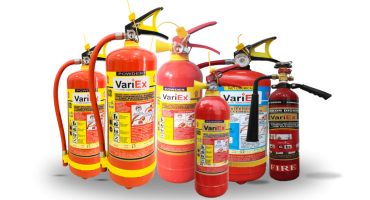 Read more +24 November 2023 in Fire Extinguisher
Read more +24 November 2023 in Fire ExtinguisherWhat types of fire extinguishers are available for different fire classes?
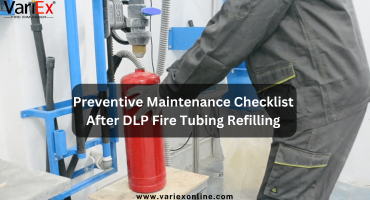 Read more +11 July 2025 in Fire Suppression
Read more +11 July 2025 in Fire Suppression

